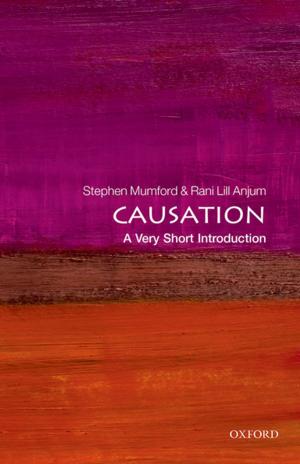Locke's Image of the World
Nonfiction, Religion & Spirituality, Philosophy, Pragmatism, History, Criticism, & Surveys| Author: | Michael Jacovides | ISBN: | 9780192507150 |
| Publisher: | OUP Oxford | Publication: | December 22, 2016 |
| Imprint: | OUP Oxford | Language: | English |
| Author: | Michael Jacovides |
| ISBN: | 9780192507150 |
| Publisher: | OUP Oxford |
| Publication: | December 22, 2016 |
| Imprint: | OUP Oxford |
| Language: | English |
Modern philosophy originates during the scientific revolution, and Michael Jacovides provides an engaging account of how this scientific background influences one of the foremost figures of early modern philosophy, John Locke. With this guiding thread, Jacovides gives clear and accurate answers to some of the central questions surrounding Locke's Essay Concerning Human Understanding. Why does he say that we have an obscure idea of substance? Why does he think that we perceive a two-dimensional array of color patches? Why does he think that matter can't naturally think? Why does he analyze secondary qualities as powers to produce ideas in us? Jacovides' method also allows him to trace the effects of Locke's scientific outlook on his descriptions of the way things appear to him and on his descriptions of the boundaries of conceivability. By placing Locke's thought in its scientific, religious, and anti-scholastic contexts, Jacovides explains not only what Locke believes but also why he believes it, and he thereby uncovers reveals the extra-philosophical sources of some of the central aspects of Locke's philosophy.
Modern philosophy originates during the scientific revolution, and Michael Jacovides provides an engaging account of how this scientific background influences one of the foremost figures of early modern philosophy, John Locke. With this guiding thread, Jacovides gives clear and accurate answers to some of the central questions surrounding Locke's Essay Concerning Human Understanding. Why does he say that we have an obscure idea of substance? Why does he think that we perceive a two-dimensional array of color patches? Why does he think that matter can't naturally think? Why does he analyze secondary qualities as powers to produce ideas in us? Jacovides' method also allows him to trace the effects of Locke's scientific outlook on his descriptions of the way things appear to him and on his descriptions of the boundaries of conceivability. By placing Locke's thought in its scientific, religious, and anti-scholastic contexts, Jacovides explains not only what Locke believes but also why he believes it, and he thereby uncovers reveals the extra-philosophical sources of some of the central aspects of Locke's philosophy.















